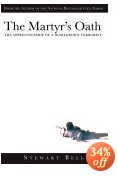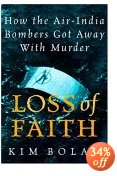The Martyr's Oath: The Apprenticeship of a Homegrown Terrorist

by Stewart Bell
254 pages,
ISBN: 0470836830
Loss of Faith: How the Air-India Bombers Got Away With Murder

by Kim Bolan
380 pages,
ISBN: 077101130X
Post Your Opinion | | Dangerous Citizens
by Martin Loney
National Post reporter Stewart Bell has played a central role in alerting Canadians to the threat posed by foreign and Canadian-born terrorists in Canada. His previous book Cold Terror (BiC, Sept 04) explored the activities of Tamil Tigers, Sikh separatists and Islamic militants who had found, in Canada, a comfortable base from which to wage their murderous struggles. In his latest book Bell focuses on the career of Kuwaiti-born Mohammed Mansour Jabarah, whose family, like that of a large number of other Kuwaitis, obtained immigrant status in Canada while retaining strong links to Kuwait. In fact, for many of those from the Gulf States it is the Canadian passport and access to Canadian health and education that attracts, not the desire to move permanently to a country whose climate and economic opportunities are not overwhelmingly alluring.
There is remarkably little published on Canada's rapidly growing Muslim community, in sharp contrast to the attention European writers have given to the position of Muslims on that continent. Much of the most insightful writing on radical Islam emerges from France, where authors like Gilles Kepel, Olivier Roy and Farhad Khosrokhavar have contributed significantly to our understanding of why Muslims born and raised in the West might not only be attracted to militant jihad, against the values and societies in which they were raised, but are increasingly defining the ideological thrust and tactics of global jihad. Bell's account of this Canadian-raised terrorist fits well with the pattern recognised by European writers-a young man uncomfortable in the permissive West who finds in a murderous interpretation of Islam his own salvation.
Jabarah's family immigrated to St. Catherines, where, to comply with the investor program through which they had gained entry, Mohammed's father purchased a gas station. It was from St. Catherines, via frequent trips back to Kuwait, Pakistan and other centres of Islamic militancy, that the young Jabarah would become a leading player in Al Qaeda and global jihad. Bell not only provides a comprehensive account of the trajectory that took Jabarah to the heart of Islamist terrorism, he offers an insightful account of the way in which Al Qaeda and similar groups recruit, nurture and transform young male Muslims into terrorists, eager to kill and die for the global struggle. The transformation of a young man-concerned at the real or alleged injustices experienced by Muslims in Palestine, Chechnya, Iraq and elsewhere-into an operative prepared to carefully plan mass murder, targeting those who might have only the remotest connection with the perceived grievances, takes time.
Jabarah's journey took him from Kuwait, through Pakistan into Afghanistan. He proved an adept pupil, coming first in his snipers' class and being selected to train as a personal bodyguard to bin Laden, but Jabarah's Canadian passport and familiarity with the West enabled him to be singled out for other tasks, notably the identification of bombing targets in the Philippines and Singapore. The Canadian Security Intelligence Service (CSIS) has an unenviable record in counterespionage, but in Jabarah's case, involvement in local Islamist fundraising activities in St. Catherines had alerted CSIS to the potential threat. Following 9/11, the agency's interest in Mohammed and his brother, Abdul Rahman, another terrorist recruit, intensified.
The discovery of the plot in Singapore caused Jabarah to flee. Ultimately, he arrived in Oman, where again the group he was involved with was apprehended, this time with Jabarah. The Omanis had little direct evidence against Jabarah, and, given his Canadian citizenship, were unwilling to extradite him to the US. Finally it was agreed that CSIS would collect him and take him back to Canada. The position of CSIS was tenuous. Bell notes that while Jabarah had "trained with Al Qaeda and helped organize mass casualty suicide bombings in Southeast Asia," he had broken no Canadian laws-such was Canada's level of preparedness. After some weeks of discussion, CSIS persuaded Jalabar to agree to go voluntarily to the US, plead guilty to various offences and provide information in return for leniency in sentencing. Jabarah remains in detention, but he is no longer cooperating with American authorities. His family, together with Canadian sympathisers, continue to portray Jabarah as a victim of unscrupulous Canadian intelligence services and demand that the government secure his return to Canada.
The Air-India bombing in 1985 stood at the time not only as the worst terrorist incident in Canadian history but as the most deadly aviation attack in the world. Twenty years later the perpetrators of the attack remain largely unpunished. The failure to detect, prevent, or effectively prosecute the perpetrators of the attack is a stark indictment of Canada's criminal justice system. The failures are the more remarkable given the extensive warning signs that were available to politicians and law enforcement personnel before the attacks. The Canadian government was repeatedly urged by Sikh moderates and other South Asians to crack down on Sikh militants who made no secret of their endorsement of violence to secure a "free" Punjab or Khalistan. Instead politicians rewarded militant platforms, and such was the ease with which extremists secured admission to this country that Sikhs with no political affiliations were known to use bogus claims of militant links to secure successful refugee claims.
Canadians who follow the news cannot help but be familiar with the debacle that was the Air-India investigation, but Bolan's account is still astonishing in terms of the sheer magnitude of the incompetence it lays bare. The Air-India bombing was simply the most dramatic and lethal of the actions of Sikh militants; there were many other occasions on which law enforcement agencies might have intervened to prosecute a pattern of violence, intimidation of Sikh moderates and others who criticised their activities. Bolan, winner of the 1999 Courage in Journalism Award for her coverage of the issue, was herself under regular police protection. The militants were not shy to advertise their intentions and didn't hesitate to literally wave their swords in the air in public demonstrations. In multicultural Canada this invited no sanction.
Bolan provides a detailed account of the background, the botched investigation, the failure to secure convictions in the recent trial and the devastating impact on the victims' families. What the book lacks is sufficient attention to the 'why' of the failure of the justice system. This is unfortunate since Canada appears to have learned little from the experience; it continues to imperil Canadians through an immigration and refugee determination process that facilitates the relocation of foreign terrorist struggles to Canadian soil. A weak legal framework, a Charter-driven legal system, incoherent interagency investigation, and high-priced legal talent will serve the next generation of terrorists as well as they served the last. Canadian politicians remain more anxious to curry ethnic support than to defend Canada's integrity. Bolan underscores the difficulty of fighting "against powerful people with connections at the highest political level in Canada." The task of critical analysis is the more urgent since the agreement to an Air-India inquiry has been accompanied by terms of reference that ensure that while law enforcement agencies will receive further (and well-merited) opprobrium, the politicians, whose policies created the context, will be free from scrutiny.
Canada continues to give little attention to the potential security dangers posed by would-be immigrants and refugees. It fails to remove even those who are deemed a threat and whose claims are denied. Both the laws and their enforcement are inadequate in this country. It is salutary to recall that when Abdullah Khadr, alleged to have actively assisted Al Qaeda in Afghanistan, by, among other things, purchasing weapons that could be used against Canadian soldiers, recently returned to Canada from Pakistan, it was the FBI that sought his extradition to face charges under American law. The RCMP had the same information but had taken no action. ò
Martin Loney's books include: The Pursuit of Division: Race, Gender and Preferential Hiring in Canada, McGill-Queen's.
|